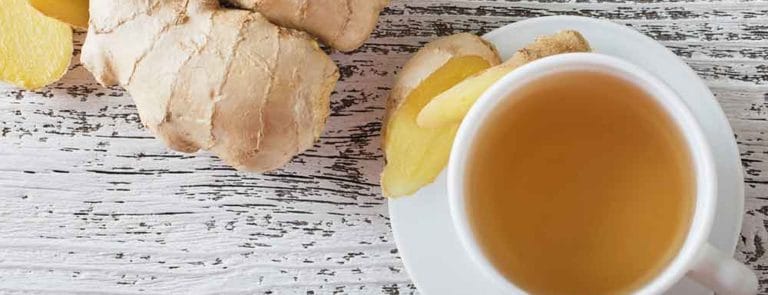10% off £35
Ginger: Big benefits & ways to use it

Ginger is most often used as an ingredient in South East Asian and Indian cooking, but the spicy root has traditionally been used for centuries,
It’s part of the Zingiberaceae family, which also includes turmeric – another edible plant with powerful health properties.1
Ginger is most often used to ease nausea, particularly during pregnancy.2
But it also has anti-inflammatory activities, which may make it an effective painkiller and help to relieve inflammatory conditions like arthritis.3
You can take ginger fresh, dried or powdered as a tea, in food, or as a supplement.
Benefits of ginger: What does ginger do in the body?
The active compounds in ginger are called gingerols.
Research suggests that these have antioxidant, antimicrobial, anti-inflammatory and anti-allergenic properties.4
This means ginger has been found to have a number of beneficial effects on our health and wellbeing.5
-
It can ease digestion
Indian researchers reported in 2004 that ginger could stimulate a number of digestive enzymes, speeding up the time it takes our body to process food, which could help prevent conditions such as constipation.6
Ginger has also been shown to be effective for indigestion.
Research led by the Chang Gung University College of Medicine in Taiwan in 2011 discovered that in patients with chronic indigestion who consumed powdered ginger before a meal, their stomachs emptied 50% faster.7
In turn, this reduced the length of time they experienced symptoms of indigestion, such as abdominal pain.
-
It can tackle osteoarthritis symptoms
Several studies have found that ginger reduces the production of various chemicals in the body, including leukotrienes, that trigger joint inflammation.8
A 2015 meta-analysis of evidence concluded that ginger was a ‘modestly efficacious and reasonably safe for treatment of OA’.9
Versus Arthritis also says that ginger has ‘moderately beneficial effects in reducing pain and disability’.10
-
It can relieve nausea
Ginger is probably most well-known for helping to calm a nervous or nauseous stomach.
Research shows that ginger can ease the symptoms of motion sickness, seasickness, morning sickness, and even nausea caused by certain medical treatments, such as chemotherapy.11
-
A natural remedy for period pain
Add ginger to your period pain tool kit. A 2009 study by Shahid Beheshti University of Medical Sciences, Iran, revealed that ginger was effective at relieving those monthly abdominal cramps.12
-
It works as a natural pain relief
If you’re in training or recently upped your fitness regime, add ginger to your gym kit.
US researchers found that taking 2g of ginger after an exercise session reduced muscle soreness by 25%.13
In addition, a 2009 study by Shahid Beheshti University of Medical Sciences, Iran, revealed that ginger was effective at relieving menstrual abdominal cramps.14
Dosage: How much ginger is safe to take?
There is no reference nutrient intake (RNI) for ginger, but it’s not recommended that you consume more than 3-4g of ginger a day from all sources, including food and supplements.15
Research so far has found that using ginger for nausea and vomiting during pregnancy has no harmful effects on the mother or baby’s health, but pregnant women are advised to consume no more than 1g of ginger a day.16,17
Side-effects: What are the side-effects of taking ginger?
If you do ingest too much ginger, you may experience:18
- heartburn
- indigestion
- diarrhoea
- burning or painful mouth
If you are pregnant, breast-feeding or taking any medication, talk to your GP before upping your intake of ginger, either fresh or as supplements.
Ginger essential oil: Uses and benefits
Ginger oil, as the name suggests, comes from the rhizome (the roots) part of ginger plants.
Just like the food ingredient, ginger essential oil has a warm and spicy scent that can be used in aromatherapy and topically.
The ginger plant (or Zingiber Officinale) comes from the same plant family that turmeric and cardamom comes from and is found worldwide, particularly in Asia and Africa.19
How is it made?
As with most essential oils, ginger oil is extracted from ginger plant tree sap in a number of ways, which usually involves steam distillation.20
How long have people been using ginger essential oil for?
Ginger as a whole has a long-standing reputation for being a natural healer.21
It was used by the Romans and Greeks for various treatments, ranging from flavouring food to aiding digestion.22
Ginger root has been used for thousands of years in folk medicine and is renowned for its flavouring and digestive properties.
While in Ayurvedic medicine, ginger oil has traditionally believed to help with emotional issues, such as anxiety and low self-confidence.23
How can it be used?
There’s so much you can do with ginger oil. You can:24
Inhale it
By putting 1 to 2 drops of it into a facial steamer or a hot bowl of water. If using the second method, cover your head with a towel to capture all of the ginger oil vapours.
You can also breathe it in directly from the bottle, or sprinkle some droplets on a towel or cloth and pop it underneath your pillow.
Spray it
To freshen up your room. To make a room spray, simply add 10 to 15 drops per ounce of water to a spray bottle and spritz away!
Apply it
Dilute it with a carrier oil (such as almond, jojoba, coconut or avocado oil) and then apply a few drops to the bottom of your feet or rub it into your pulse points.
Diffuse it
Put some in a diffuser and breathe in the warm and spicy scent. (Try this: combine 3 drops of ginger oil with 2 drops of bergamot and 2 drops of patchouli essential oils).25
Massage it
Dilute 5 drops of essential oil with 10ml of Miaroma base oil and gently apply.
Note – it blends well with lemon, cinnamon, rosemary and peppermint oils).26
Bathe in it
Add 4 to 6 drops of oil into warm running water. Then relax in the bath for at least 10 minutes to allow the aroma to work.27
Ginger oil benefits
Ginger oil has widespread anti-inflammatory and antioxidant properties. As a result, there are lots of benefits to using it, including these five:28
- Reduces inflammation – initial studies have found that ginger can help soothe and ease the body.29
- Fades scars – because of its antioxidant properties that can reduce the appearance of hypopigmented scars.30
- Aids anxiety – thanks to its warming and calming properties.31
- Ease the senses - inhaling ginger essential oil can help reduce the build-up of mucus in the lungs and throat.32
- Reduce the feelings of nausea – the pleasant aroma’s said to help stomach upsets, as well as motion, morning, altitude and migraine-related sickness. It also helps to aid digestion when inhaled, which can potentially contribute to nausea.33
How to use it safely
Always do a patch test to it make sure it doesn’t irritate your skin and always dilute it first with a carrier oil before putting it on your skin.
Always follow the manufacturer’s guidelines on how to use it.34
Some interesting facts about ginger oil
- Ginger oil is thought to be even more powerful than ginger because it contains more Gingerol, which has antioxidant and anti-inflammatory properties
- It has been found to work as a natural aphrodisiac
- It’s also widely referred to as ‘The Oil of Empowerment’
- It can help promote hair growth. Dilute a few drops with a carrier oil and then massage the mixture through your hair and scalp. Leave it in for 15 to 30 minutes and rinse with warm water.
Last updated: 19 August 2021
- https://www.medicalnewstoday.com/articles/265990
- https://www.bda.uk.com/foodfacts/Pregnancy.pdf
- https://www.ncbi.nlm.nih.gov/pubmed/26228533
- https://www.ncbi.nlm.nih.gov/pubmed/26228533
- https://www.healthline.com/nutrition/11-proven-benefits-of-ginger
- https://www.ncbi.nlm.nih.gov/pubmed/15218978
- https://www.ncbi.nlm.nih.gov/pmc/articles/PMC3016669/#B1
- https://www.versusarthritis.org/about-arthritis/complementary-and-alternative-treatments/types-of-complementary-treatments/ginger/
- https://www.sciencedirect.com/science/article/pii/S106345841401276X
- https://www.versusarthritis.org/about-arthritis/complementary-and-alternative-treatments/types-of-complementary-treatments/ginger/
- https://www.ncbi.nlm.nih.gov/pubmed/10793599
- https://www.ncbi.nlm.nih.gov/pubmed/19216660
- https://www.ncbi.nlm.nih.gov/pubmed/20418184%20
- https://www.ncbi.nlm.nih.gov/pubmed/19216660
- https://www.healthline.com/health/ginger-water
- https://www.ncbi.nlm.nih.gov/pubmed/27246791
- https://www.healthline.com/health/ginger-water
- https://www.healthline.com/health/ginger-water
- https://www.healthline.com/health/ginger-oil#benefits
- https://www.byrdie.com/benefits-of-ginger
- https://www.decleor.com/en/oil-effects/regeneration/ginger.html
- https://www.newdirectionsaromatics.com/blog/products/all-about-ginger-oil.html
- https://www.newdirectionsaromatics.com/blog/products/all-about-ginger-oil.html
- https://www.hollandandbarrett.com/shop/product/miaroma-ginger-pure-essential-oil-60031292
- https://www.hollandandbarrett.com/shop/product/miaroma-ginger-pure-essential-oil-60031292
- https://www.goodhousekeeping.com/health/a25835590/how-to-make-ginger-oil/
- https://www.byrdie.com/benefits-of-ginger
- https://www.decleor.com/en/oil-effects/regeneration/ginger.html
- https://www.essentialoilhaven.com/ginger-essential-oil-uses-benefits/
- https://www.edensgarden.com/blogs/news/5-ways-to-use-ginger-essential-oil
- https://www.newdirectionsaromatics.com/blog/products/all-about-ginger-oil.html
- https://www.decleor.com/en/oil-effects/regeneration/ginger.html
- https://www.decleor.com/en/oil-effects/regeneration/ginger.html
- https://www.healthline.com/health/ginger-for-hair#side-effects-and-precautions














